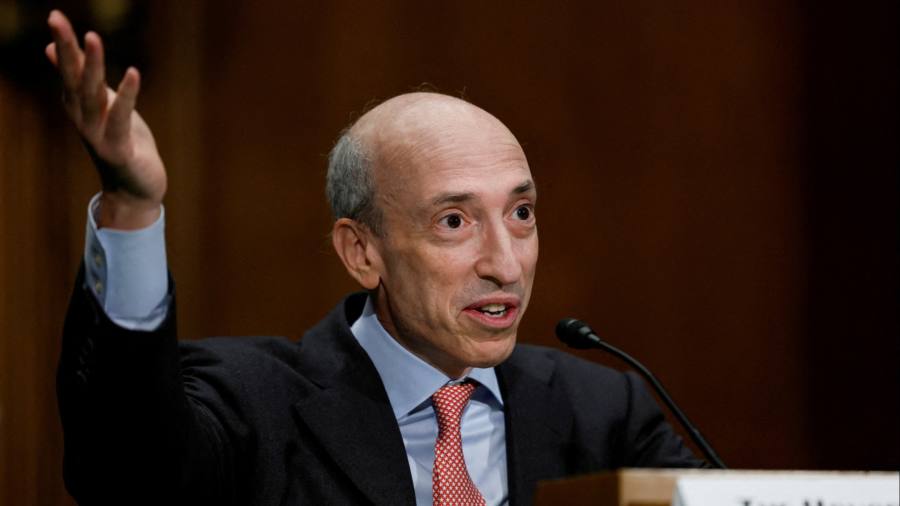
Banks, trading firms and brokers are bracing for the biggest overhaul of US stock trading in almost two decades with the release on Wednesday of plans designed primarily to lower costs for small investors.
The Securities and Exchange Commission is set to vote on four proposals aimed at pushing brokers and market-making firms to execute deals at the best price available — and prove this was done.
Industry executives have described the reforms as the most sweeping since 2005, when a set of rules known as Regulation National Market System also addressed conditions for small investors by modernising US equity markets.
“Potentially these could be the most significant changes to the regulation of equity market structure since regulation NMS,” said Paul Mahoney, law professor at the University of Virginia.
After the meme-stock boom of 2021, when retail traders sent the prices of a handful of stocks into the stratosphere, SEC chair Gary Gensler this year revived debate about making further changes to market rules.
Last year’s trading frenzy highlighted the practice of “payment for order flow” where popular retail brokers such as Robinhood are paid to route customer orders to big trading companies including Citadel Securities and Virtu Financial.
So-called PFOF is banned in several other jurisdictions including the UK and Canada. Gensler has warned about the risks of conflicts of interest raised by PFOF, including brokers’ use of video game-like digital features to encourage customer trading.
“There’s been at least 20 conferences that I’ve attended over the past two years where [regulation] was the only topic people wanted to talk about,” said Anthony Denier, chief executive of retail broker Webull. “It’s been discussed so much by people on either side of the PFOF fence, we are looking forward to an actual proposal or for something to actually come forward.”
The SEC is not expected to block PFOF, but the proposals could significantly curtail its use in several ways. One item on Wednesday’s agenda would require brokers to auction customers’ orders. Another item would require them to publish detailed data showing how orders were carried out.
Thomas Peterffy, chair of Interactive Brokers, said: “There is a lot of talk about how execution quality is already as good as it can be. That is very possible, but it would be reassuring for the customer to really see that it is as good as it can be. ”
If the SEC’s five commissioners vote to propose the new requirements, they will undergo to a public comment period before returning to the regulator for final approval and adoption. The plans are said to run for more than 1,000 pages, according to industry officials.
Big trading firms are expected to oppose the new auction requirement, having warned previously it could increase trading uncertainty and raise, not lower, costs for small investors.
One market maker said: “The proposals as they’ve been previewed are solutions in search of a problem. And that concern has been expressed by virtually every corner of the marketplace.”
Other rule changes on Wednesday’s agenda include cutting the price increment, or “tick size”, in which a stock can trade to less than a cent and a new standard for “best execution”, which requires brokers to ensure they have found the best price, at that time, for their client’s trade.
Stock exchanges broadly support smaller tick sizes, which they believe would help exchanges compete with other venues that already offer sub-penny trading to big wholesale investors.
SEC commissioners are also scheduled to vote on a separate final rule that would require US corporate executives to wait four months to sell shares after establishing a so-called 10b5-1 plan, according to two people familiar with the rulemaking. Such plans allow company insiders to sell shares automatically without risk of violating insider trading rules.
The new rule would end a controversial practice in which executives sell stock days after creating a plan, raising suspicion that they may have acted with inside information.
A Financial Times investigation last year found Beijing-based Cheetah Mobile chief executive Sheng Fu sold $31mn of shares a few weeks before reporting disappointing quarterly earnings. In September 2022, the SEC charged Fu with insider trading, saying that he established a trading plan knowing a big drop in advertising revenues was about to be announced.
The SEC unanimously proposed the four-month waiting period a year ago, but now at least one Republican SEC commissioner is expected to vote against the final rule, person familiar with the matter said.
Reporting by Stefania Palma in Washington and Madison Darbyshire, Nicholas Megaw, Patrick Temple-West and Jennifer Hughes in New York